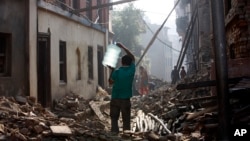Nepal's government continues to be at odds with the international aid community on the priorities and pacing for earthquake relief.
A 7.8-magnitude quake on April 25 and second major quake on May 12 left more than 8,700 people dead. Tens of thousands of people are still in need of assistance.
Late last month Nepal received $4.4 billion in aid pledges, which the government says is two-thirds of what will be needed over five years for rebuilding.
The government wants the reconstruction phase to start quickly, while the U.N. and other organizations prefer to wait until after the monsoon rains. In the meantime, the international groups prefer to continue to focus on providing food, water, sanitation and basic shelter.
However, those efforts are again being frustrated by the government re-imposing customs duties and other taxes that were temporarily lifted in the days after the quake.
Government Taxing Aid Imports
United Nations resident coordinator Jamie McGoldrick notes that in past disasters, such as in Haiti and Pakistan, there has customarily been a 90-day waiver period for such government-imposed charges.
The United Nations is “trying to find a solution to where we could actually come up with a way of undoing some of the current blockages, both in terms of warehousing and customs,” McGoldrick, in Kathmandu, told VOA Friday.
“Particularly, we're looking at the corrugated iron sheeting which is the essential commodity that we need right now to be distributed to the affected populations, especially in the high areas, before the monsoon comes in and makes our job delivering those much more difficult,” McGoldrick explained.
The seasonal torrential rains are likely to trigger landslides, further damaging roads impaired by the quakes.
Nepali Media Report 'Rotten' Food Aid
Meanwhile, Nepal's media has intensively criticized the U.N.'s World Food Program for allegedly distributing some rotten, decayed or otherwise substandard rice to quake survivors.
“No spoiled food has made it to the community” and in two cases where substandard rice was found the bags were “quickly identified before distribution,” the WFP said in a statement on Thursday.
The organization emphasizes it has fed two million people since the quake and denies domestic media reports it is threatening to leave Nepal.
U.N. officials in public and private comments in recent days berated the domestic media for what they consider inaccurate reporting.
“We all deserve criticism in any emergency because we never get it right, it's so complicated,” one senior U.N. official told VOA on Friday. “But it's unfair to take on a few hundred bags of rice and then blame the whole WFP and the whole U.N. family for getting that wrong.”
Nepali Times publisher/editor Kunda Dixit points fingers at both the competitive domestic media and the diplomatic community's handling of the matter. He also sees a Kathmandu government eager to deflect “criticism of its handling of its response” to the quakes.
Nepal's bureaucracy is accused of wrapping its quake response in red tape, amid suspicion of layers of profiteering in collusion with corrupt politicians and other officials.
Dixit notes a “strained relationship” between outside donors – especially the British and the Nordic countries – and Nepal's transitional government, a situation that predates the April quake.
Officials in Kathmandu have long been unhappy about donor money going into the political arena, for things such as promotion of human rights, democracy and inclusion, Dixit told VOA.
“I think we need to move on from this,” said Dixit, one of Nepal's senior journalists.
Government Resignations
Nepal's agriculture minister resigned on Thursday. But his departure has nothing to do with the quake aid controversy.
Hari Prasad Parajuli quit after social media sites in Nepal were inundated with photos and video clips of the mud-covered minister allegedly chasing, hugging and groping women during Tuesday's National Paddy Day celebration.
Parajuli is the fourth minister to resign from the weak government of prime minister Sushil Koirala, who is recovering from treatment for lung cancer.
Koirala's government, in cooperation with several major political parties, Tuesday presented a draft of a 297-article republican constitution, rushed through following the quakes. But the country's supreme court has already raised questions about the charter's legality.
Nepal, hobbled by a decade-long civil war until a 2006 peace deal with Maoist rebels, is one of the world's poorest countries with a quarter of its 28 million people living on less than $1.25 per day.
This year's quakes have added another layer of misery, destroying a half million houses and pushing into poverty an estimated 700,000 additional people.





